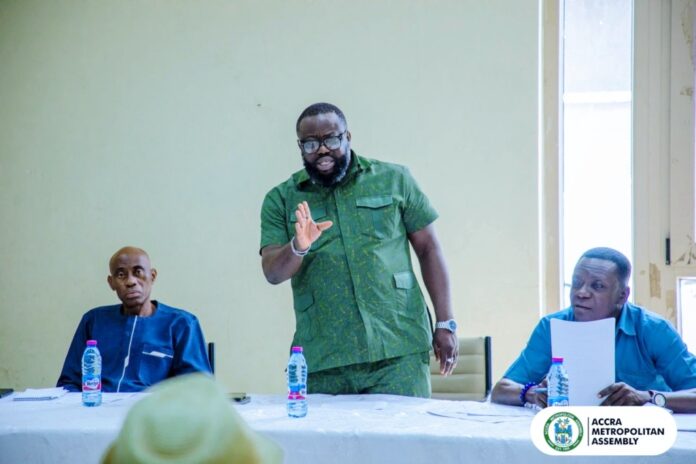The Executive Committee of the Accra Metropolitan Assembly (A.M.A.) has unanimously adopted a comprehensive set of initiatives presented by Michael Kpakpo Allotey, Mayor of Accra, to mark a new phase in the city’s governance and development strategy.
The initiatives—targeting sanitation, urban order, economic inclusion, digital enforcement, climate action, and infrastructure development—were adopted on Tuesday during the maiden Executive Committee meeting following the Mayor’s confirmation by Assembly Members.
They include the 24-Hour Clean Accra Initiative, the Mayor’s Special Ball, the Special Weekend Trading Initiative, the establishment of the A.M.A. City Authority Guards, the introduction of a 24-Hour Ticketing Cycle, the Green Accra Initiative, and a comprehensive Public-Private Partnership (PPP) Programme for urban redevelopment and infrastructure enhancement.
The Mayor explained that the 24-Hour Clean Accra Initiative seeks to introduce a three-shift sanitation system and waste segregation to ensure continuous cleanliness and job creation, while the Mayor’s Special Ball aims to mobilise funding for critical infrastructure, education, health, and sanitation projects through public-private collaboration.
He pointed out that the Special Weekend Trading Initiative institutionalises designated vending days and spaces to promote lawful, organised trading and reduce congestion. He added that the formation of the A.M.A. City Authority Guards is intended to strengthen by-law enforcement and safeguard public spaces.
Mayor Allotey noted that the 24-Hour Ticketing Cycle would leverage digital tools for real-time monitoring and enforcement across the city to boost compliance and revenue.
As part of measures to respond to climate threats, he announced the launch of the Green Accra Initiative to enhance urban greening, biodiversity, and air quality. The Public-Private Partnership (PPP) Programme will complement this effort by driving large-scale infrastructure redevelopment—including markets and transport terminals—through strategic collaboration with the private sector.
“This is a new chapter for Accra,” the Mayor stated. “If we work together to block revenue leakages and implement these ideas with discipline and integrity, we will leave a lasting legacy for our city.”
The committee also adopted several strategic recommendations from its sub-committees, including Finance and Administration, Revenue Mobilisation, Environmental and Disaster Management, Education and Sports, Social Services, Transport, Works, Justice and Security, and Development Planning. These are expected to enhance revenue generation, environmental management, education, and urban administration within the metropolis.
The Executive Committee of a District Assembly in Ghana is established under the Local Governance Act, 2016 (Act 936), which replaced the previous Local Government Act, 1993 (Act 462). It is responsible for coordinating sub-committee plans, implementing Assembly resolutions, overseeing district administration, advising on development policies, executing approved projects, and acting on behalf of the Assembly between sittings—while ensuring members are informed of its decisions at least seven days before each Assembly meeting.



